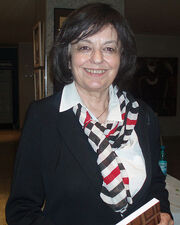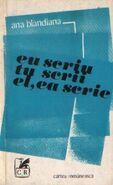
Ana Blandiana (Romanian pronunciation: [ˈana blandiˈana]; pen name of Otilia Valeria Coman; b. 25 March 1942, Timişoara) is a Romanian poet, essayist and political figure. She took her name after Blandiana, near Vințu de Jos, Alba County, her mother's home village.
Coman's parents were Gheorghe (1915-1964), a priest who spent years in Communist prisons and died in an accident weeks after his release in a general amnesty, and Otilia (Diacu), an accountant. Her sister Geta was born in 1947. In 1960 she married the writer Romulus Rusan. After her debut in 1959, in Tribuna, Cluj, where she signed for the first time as Ana Blandiana, she was published in the anthology 30 de poeți tineri ("30 Young Poets"). In 1963, after a four-year interdiction due to her father's status, she again published in Contemporanul (edited by George Ivașcu). Her editorial debut took place in 1964 with the booklet of poems Persoana întâia plural ("First Person Plural"), with a Foreword written by Nicolae Manolescu. She became known for her volumes Călcâiul vulnerabil ("Achilles' Heel", 1966) and A treia taină ("The Third Secret", 1969). In 1966, Blandiana appeared for the first time at the International Poem Contest (in Lahti, Finland). In 1967, she settled in Bucharest; until the following year, she was one of the editors for Viața studențească, and then (until 1975) worked as editor for Amfiteatru.
She gave two televised readings in 1969, in the company of Andrei Șerban and the actors Irina Petrescu, Mariana Mihuț and Florian Pittiş. Between 1975 and 1977, she was a librarian at the Institute of Fine Arts in Bucharest. In 1976, her works were first printed in a French translation, in Croisière du Club des Poètes by fr:Jean-Pierre Rosnay (Paris); in 1978, she took part in the First International Festival of Poetry in Paris organized by the famed Club des Poètes.
In 1984 Blandiana's poem 'Totul' ('Everything') was briefly published in the literary magazine Amfiteatru. 'Totul' was a list of elements of everyday life in Bucharest at the time, composed as a comment on the contrast between the official view of life in Romania and the alternative perception of its monotonous shabbiness. The critical nature of the poem led to the edition of Amfiteatru being withdrawn within hours of publication with the editors being dismissed. Nevertheless, the poem appeared in translation in Western media and also had limited underground circulation in Romania. However, in 1987 she published at the Sport-Turism Publishing House the book Oraşe de silabe ("Cities of Syllables") where she writes about all the countries and cities of the world where she traveled in spite of the 'communist dictatorship': over 100. The same year, 1987, she is published in USSR, at Raduga Publishing House from Moscow, with the Russian title Stihotvorenia, rasskazî, asse. Even though the secret services of Ceaușescu ('Securitate') attribute her a dissident status, in 1989 the Minerva Publishing House is publishing in the popular mass collection "Biblioteca Pentru Toți" ("Library for all people") an anthology of her poems. Her friends sustain that the book did not see the bookshelves of the libraries at the time. However, "Poezii" ("Poems") has a 'Foreword' written by Eugen Simion. After the Romanian Revolution of 1989, she entered political life, campaigning for the removal of the communist legacy from administrative office, as well as for an open society.
She left literary work in the background, although she did publish Arhitectura valurilor ("Waves' Architecture", 1990), 100 de poeme ("100 Poems", 1991), and Sertarul cu aplauze ("The Drawer of Applause", prose, 1992). In 1992 she advocates for the released from prison of old time Party member Gheorghe 'Gogu' Radulescu, a former member of the Executive Political Committee of the Central Committee of the Communist Party and protector of herself during the communist period.
Her work was translated into 16 languages.
Books[]
Poetry (and books for children)[]
- Persoana întâia plural (First Person Plural), 1964 (with foreword by Nicolae Manolescu);
- Călcâiul vulnerabil (Vulnerable Heel/Achilles' Heel), 1966;
- A treia taină (The Third Secret), 1969;
- Cincizeci de poeme (50 Poems), 1970 (anthology);
- Octombrie, noiembrie, decembrie (Octomber, November, December), 1972;
- Poeme (Poems), 1974 (anthology);
- Somnul din somn (The Sleep in the Sleep), 1977;
- Poeme (Poems; anthology in Cele mai frumoase poezii collection), 1978;
- Întâmplări din grădina mea (Events from My Garden), 1980;
- Ochiul de greier (The Grasshopper Eye), 1981;
- Ora de nisip (The Sand Hour; anthology in Poeți români contemporani collection), 1984;
- Stea de pradă (Predator Star), 1986;
- Alte intâmplări din grădina mea (Other Events from My Garden), 1987;
- Întâmplări de pe strada mea (Events on My Street), 1988;
- Poezii (Poems), 1989 (anthology in Biblioteca pentru toți collection);
- Arhitectura valurilor (Waves' Architecture), 1990;
- 100 de poeme (100 Poems), 1991 (anthology);
- În dimineața de după moarte (In The Morning After Death), 1996;
- La cules îngeri (Harvesting Angels), 1997, 2003, 2004 (anthology);
- Cartea albă a lui Arpagic (Arpagic's White Book), 1998;
- Balanța cu un singur talger (Balance with a Single Scale), 1998;
- Soarele de apoi (Aftersun/Final Sun), 2000;
- Refluxul sensurilor (Ebb of Meanings), 2004, 2008;
- Un arhanghel murdar de funingine: poeme rostite la Radio 1970-2004 (A Grimy Archanghel: Poems Read on the Radio), 2004 (audiobook);
- Poeme (1964-2004), 2005, 2008 (anthology);
- Timpul scrie pe trupul meu versuri (Time Writes on My Body Stanzas), 2008 (audiobook);
- Întoarcerea lui Arpagic (Arpagic's Return), 2008, 2011 (audiobook);
- Opera poetică (Poetic Works), I-II, 2008 (anthology);
- Patria mea A4 (My A4 Country), 2010;
- Pleoape de apă (Water Eyelids), 2011 (anthology).
Prose and essay[]
- Calitatea de martor (Witness Attribute), 1970, 2003;
- Eu scriu, tu scrii, el/ea scrie (I Write, You Write, He/She Writes), 1975;
- Cele patru anotimpuri (The Four Seasons), 1977, 2001;
- Cea mai frumoasă dintre lumile posibile (The Most Beautiful of All Possible Worlds), 1978;
- Proiecte de trecut (Past Projects), 1982;
- Coridoare de oglinzi (Mirror Halls), 1983;
- Autoportret cu palimpsest (Self-Portrait with Palimpsest), 1985;
- Orașe de silabe (Syllable Cities), 1987;
- Sertarul cu aplauze (Drawer of Applause; novel), 1992, 1998, 2002, 2004;
- Imitație de coșmar (Nightmare Imitation), 1995;
- Geniul de a fi (The Genius To Be), 1998;
- Ghicitul în mulțimi (Crowd Guesswork), 2000;
- Cine sunt eu? (Who Am I?), 2001;
- Orașul topit și alte povestiri fantastice (The Melt City and Other Fantastic Stories), 2004;
- A fi sau a privi (To Be or to See), 2005;
- O silabisire a lumii (Spelling Out the World), 2006;
- Spaima de literatură (Fear of Literature), 2006, 2010;
Translations (incomplete list)[]
- Homokora, Kriterion Konyvkiado, Bucharest, 1971 (in Hungarian);
- Pieta achillesowa i inne wiersze, Wydawnictwo Literackie, Krakow - Wroclaw, 1982 (in Polish);
- Valaki engem almodik, Kriterion Konyvkiado, Bucharest, 1985 (maghiară);
- San v sania, Narodna Cultura, Sofia, 1986 (in Bulgarian);
- Kopie eines Alptraums, Volk und Welt, Spektrum, Berlin, 1988 (in German);
- L'ora di sabbia, Edizioni Saval, Bologna, 1987 (in Italian);
- Stihotvorenia, rasscazi, esse, Radouga, Moskva, 1987 (in Russian);
- The Hour of Sand, Anvil Press Poetry, London, 1989, 1990 (in English);
- Mineviku - Plaanid, L.R., Tallinn, 1989 (in Estonian);
- Sniega Stunda, Liesna, Riga, 1989 (in Letonian);
- En kyrka full av fjarilar, Symposion Bokforlag, Stockholm, 1990 (in Swedish);
- Kanskje noen drommer meg, Solum Forlag, Oslo, 1990 (in Norwegian);
- Kopie eines Alptraums, Steidl Verlag, Bokforlaget Hypatia, Stockholm, 1992 (in Swedish);
- L'eglise fantome, Syros-Alternatives, Paris, 1992 (in French);
- Kopie van een nachtmerrie, Amsterdam, 1992 (in Dutch);
- Svedotzi, Biblioteka Kov, Vrsatz, 1993 (in Serbian);
- Poezi, Shtepia Botuese Enciklopedike, Tirana, 1993 (in Albanian);
- Presentation/ Vorwort/ Prezentare, trilingual edition, DAAD (Deutscher Akademischer Austauschdienst/ Office Allemand d'echange universitaires), Paris, 1993 (in German, French and Romanian);
- Streiflicht – Eine Auswahl zeitgenössischer rumänischer Lyrik (81 rumänische Autoren), - "Lumina piezișă" (Askew Light), bilingual edition with 81 Romanian writers translated by Christian W. Schenk, Dionysos Verlag, 1994
- Clair de mort, Librairie Bleue, Troyes, 1994 (in French);
- Kopi av et mareritt, Gyldendal Norsk Forlag, Oslo, 1995 (in Norwegian);
- Die Applausmaschine, Steidl Verlag, Gottingen, 1993 (in German);
- Engelernte, Ammann Verlag, Zurich, 1994 (in German);
- L'architecture des vagues, les Ateliers du Tayrac, 1995 (in French);
- Kopie eines Alptraums, Fischer Taschenbuch Verlag, Frankfurt am Main, 1996 (in German);
- Ofullbordad helvet, Forlags ab Gondolin, 1997 (in Swedish);
- Szelet Allat, Pont, Budapest, 1998 (in Hungarian);
- Gedichten, Go-Bos Press, 1998 (in Dutch);
- Sternenherbst, Dionysos, translation by Christian W. Schenk, 1999 (in German);
- Cekmedjeto s aplodismenti, DAR, Sofia, 1999 (in Bulgarian);
- Potreba za priciom, Arka, Smederevo, 2000 (in Serbian);
- Isbrane pesmi, Cankarjeva zalozba, Ljubljana, 2003 (in Slovenian);
- Potreba za razgovor, Arka, Smederevo - Id. Skoplje, 2004 (in Macedonian);
- Sower, Beijng, 2004 (in Chinese);
- Arhanghel vo saghi, Editia Plejadi, Struga, 2004 (in Macedonian);
- Un tempo gli alberi avevano occhi, Donzelli Editore, Rome, 2004 (in Italian);
- Projectos de passado, Editura Cavallo de Ferro, Lisbon, 2005 (in Portuguese).












































